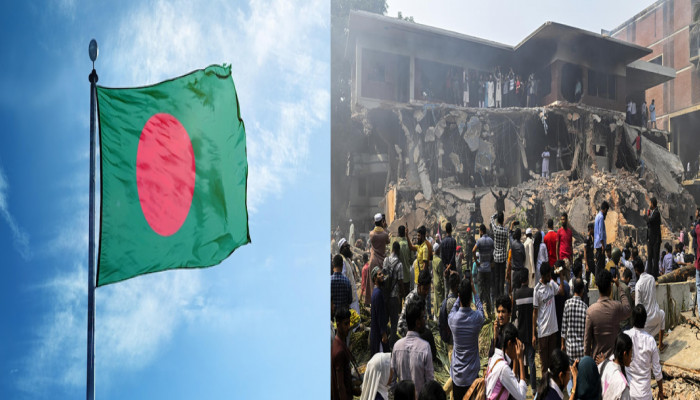Bangladesh government warns of stern action after widespread vandalism across country
- In Reports
- 12:15 PM, Feb 08, 2025
- Myind Staff
Bangladesh's interim government, led by Nobel Peace Prize winner Muhammad Yunus, announced on Friday that it will take action to stop vandalism and arson happening across the country. This decision comes as a major opposition party and neighbouring India express concerns over attacks on a historic house linked to former Prime Minister Sheikh Hasina, who was recently removed from office.
Since Wednesday night, mobs have been attacking supporters of Prime Minister Sheikh Hasina, vandalising homes and businesses across the country. Many properties belonging to former lawmakers, Cabinet members, and leaders of Hasina's Awami League party were set on fire. The attacks appear to be part of a coordinated campaign, even targeting the former home of Bangladesh's independence leader, Sheikh Mujibur Rahman—Hasina's father—in the capital, Dhaka. Hasina's frequent provocative statements from exile to sow discord in Bangladesh, according to the interim government, were the cause of Wednesday's attack... An hour before Hasina began speaking to her Indian followers, the demonstrators began to storm the premises.
Hasina left the country for India on August 5 after a student-led mass uprising brought an end to her 15-year rule. On Friday morning, Yunus' press office issued a brief statement, warning that strict action would be taken against such acts of violence. Another statement credited to Yunus was released late Friday, stating that the interim leader urged all residents to promptly restore full law and order and ensure that Hasina's and her supporters’ family properties would not be attacked again.
More than 24 hours after the attack, statements were released regarding the building where Rahman had declared Bangladesh's independence from Pakistan in 1971. The attack happened on Wednesday night after a day of social media campaigning by Hasina's critics and student leaders. They had announced a bulldozer procession toward Rahman's house, which Hasina had turned into a museum. As protesters stormed the building, the police did not intervene. Later, a team of soldiers tried to stop them but eventually left.
An intelligence official in Dhaka told The Associated Press that around 70 attacks have been reported across Bangladesh since Wednesday, following the vandalism and arson at Rahman's home. According to the country's leading English newspaper, The Daily Star, acts of violence against Hasina's supporters have occurred in at least 20 districts. Meanwhile, Dhaka's Channel 24 TV reported unrest in at least 35 districts. The station also noted that the village home of Abdul Hamid, a veteran politician from Hasina's party and former president of Bangladesh, was among the targets. New attacks were reported late Friday, despite demands for a halt. Since Hasina's removal, protest groups have openly announced their plans in advance, with their actions broadcast live on social media and mainstream TV channels. Rights groups report that at least 80 Islamic Sufi shrines have been attacked, allegedly by hard-line Islamists. This week's violence also follows claims from a major minority rights group that the interim government has not done enough to protect them. However, authorities deny this, stating that the incidents are politically motivated and not linked to community tensions.
The Bangladesh Nationalist Party, led by Hasina's principal political opponent and former prime minister Khaleda Zia, called on the Yunus-dominated government to ease the situation in a statement released early Friday. “Otherwise, anarchy will spread across the country,” it said. On the other hand, in a statement released Thursday, India, which supported Bangladesh's struggle for independence from Pakistan in a brutal war in 1971, denounced the demolition of Rahman's home and described the location as a testament to valiant resistance. It threw the spotlight on the role of historic Rahman's house in shaping the national identity of Bangladesh.
“All those who value the freedom struggle that nurtured Bangla identity and pride are aware of the importance of this residence for the national consciousness of Bangladesh. This act of vandalism should be strongly condemned,” read the statement.
India called Bangladesh's acting high commissioner to New Delhi on Friday. This happened a day after the Yunus-led government asked India to prevent Hasina from making provocative statements while in exile. Relations between the two countries have been tense in recent months. India’s Ministry of External Affairs clarified in a statement that Hasina's recent remarks were made in her personal capacity and that India has no involvement in them. "It is, however, regrettable that regular statements made by Bangladesh authorities continue to portray India negatively, holding us responsible for internal governance issues. These statements by Bangladesh are in fact responsible for the persistent negativity,” it said.
Bangladeshi political analyst Nazmul Ahsan Kalimullah warned on Thursday that such violence could seriously threaten the country's goal of achieving a democratic transition through elections. Meanwhile, Yunus stated that a new election will take place either in December or by June 2026.







Comments